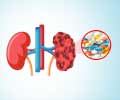Two new studies offer insights on how physicians can effectively and efficiently evaluate patient-reported outcomes and health-related quality of life in individuals with kidney disease.

‘Adopting patient-reported outcome-based approaches to manage end-stage chronic kidney disease (ESCKD) patients' health is a promising way toward easing the burden of illness.’





In a JASN study that included 485 patients with CKD, John Ware, Jr., PhD (John Ware Research Group) and his colleagues developed and evaluated an improved and briefer approach to measuring quality of life across the spectrum from early CKD to kidney failure, or end-stage kidney disease (ESKD). The team found that both 6-item and adaptive forms of this Chronic Kidney Disease Quality of Life (CKD-QOL) instrument performed better across multiple tests of validity in head-to-head comparisons with a generic assessment of health-related quality of life called SF-12v2 and with CKD-specific KDQOL-36 measures. "Quality of life is the most important outcome to patients, and the computer adaptive survey pays attention to a patient’s answers, saves time, and doesn’t ask questions that are irrelevant to that individual patient," said Dr. Ware. "This research brings us closer to measures of quality of life that are specific to kidney disease and could meaningfully inform the care of individual patients."
In another JASN study, a team led by John Peipert, PhD (Northwestern University Feinberg School of Medicine) and Ron Hays PhD (UCLA David Geffen School of Medicine) aimed to increase the KDQOL-36’s usefulness for patients with ESKD by providing reference values for the US dialysis population. "These reference values will help give context to individual patients’ and groups of patients’ KDQOL-36 scores by providing a national norm to compare to," said Dr. Peipert. "In addition, for circumstances where a single, composite KDQOL-36 score is useful, we have provided evidence of the reliability and validity for a summary score derived by combining the 3 KDQOL-36 kidney-targeted scales to create the KDQOL-36 Summary Score."
In an accompanying perspective, Dr. Peipert and Dr. Hays noted that ESKD patients stand to benefit from a variety of new clinical and evaluation opportunities with patient-reported outcomes that will help align care with patients’ priorities and open new channels for communication between patients and their doctors. "The burden of disease for ESKD patients is formidable and impacts many aspects of patients’ lives," they wrote. "Adopting patient-reported outcome-based approaches to manage ESKD patients’ health is a very promising way toward easing this burden."
Advertisement















